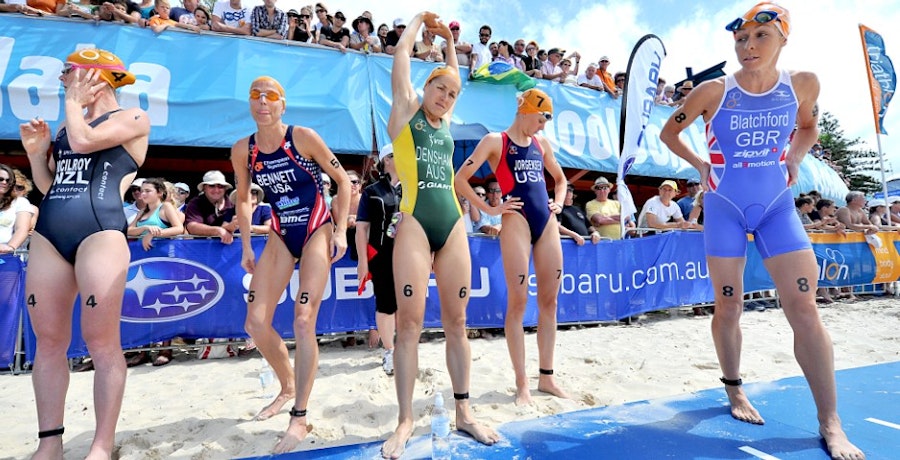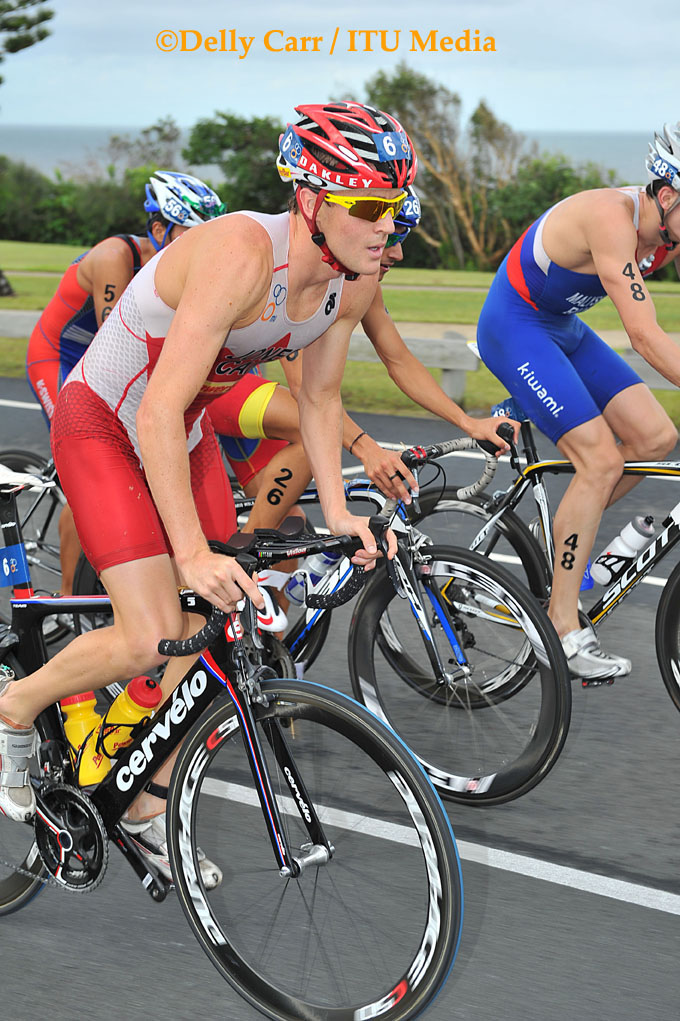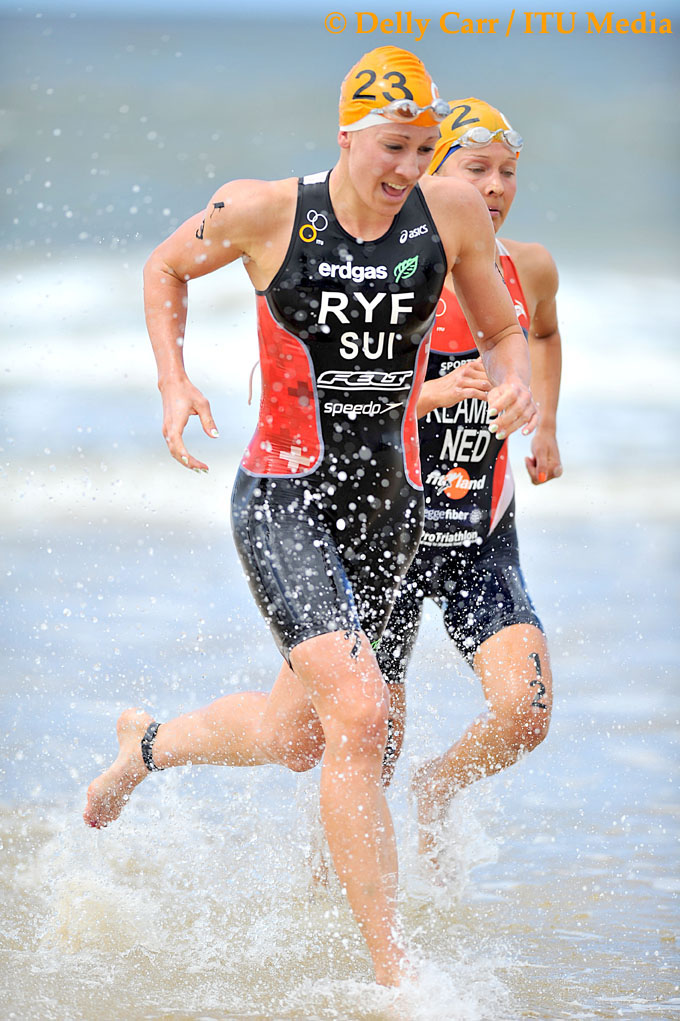
In the home straight of the London 2012 Olympics Qualifying period, which officially closes on May 31st, we’ll take a look at the Olympics simulator after every major race. By taking the current qualification information, that tells you how many athletes each NOC can send if Olympic qualification ended today, it can help show how each event shapes the Olympic field. This week it’s a chance to look into the 2012 Mooloolaba ITU Triathlon World Cup and what it meant for the London start line.
Men’s Olympic Qualification
France’s Laurent Vidal took his first World Cup win with a dramatic three-way sprint to the line and helped to further secure France’s three spots in London. It’s a story that can be said of all the men’s medallists, Vidal, Brad Kahlefeldt and David Hauss all have high rankings, which helps secure their respective National Olympic Committee at least one place. Each of the three have also secured their individual Olympic selection, Vidal and Hauss last year in London and Kahlefeldt has been nominated for pre-selection by Triathlon Australia.

The other slight changes from Mooloolaba were that given the absence of New Zealand’s top three men, Kris Gemmell, Bevan Docherty and Ryan Sissons, the New Zealand men dropped two places – from fourth to sixth – while Spain and Australia moved up. Spain’s Jose Miguel Perez finished 16th, and Courtney Atkinson 33rd, and this was enough to put their countries in fourth and fifth overall. Mario Mola’s and Sebastian Rank’s top-10 finishes were also important, while they are the fourth men for their respective NOC currently on the list – their high rankings means their countries are tightening their grip on three spots. Their results were also interesting for their individual selection, Mola is currently the fourth Spanish man and Rank the fourth German. Jan Frodeno and Steffen Justus have already qualified their spots thanks to top-8 results in London last year, but it could be close between Rank and Maik Petzold - who finished 10th in Mooloolaba - for who gets that third spot. Mola is also mixing things up for Spain’s selectors, who already have Javier Gomez, Ivan Rana and Miguel Perez ranked high.
The event that could have the most bearing on the men’s Olympic field in the next few months is the 2012 Eilat ETU European Triathlon Championships. With Great Britain not sending Alistair Brownlee to defend his title, or Jonathan Brownlee or William Clarke, Great Britain could lose their guaranteed continential championship spot. While this will not affect Great Britain’s chances to field three men in London – courtesy of the Brownlee’s podium places in London and Clarke’s high ranking they have that wrapped up – but it opens up plenty of interesting possibilities for the other countries to claim that guaranteed spot.
Click here for the current men’s Olympic simulation
Women’s Olympic Qualification
While Australia have almost secured their three spots in London, Erin Densham’s win certainly did Australia’s overall and her own selection chances no harm. As Emma Moffatt has been pre-selected, the rest of the team will come from either reigning Olympic champion Emma Snowsill,Emma Jackson, Ashleigh Gentle, Felicity Abram and Densham, who devastated the field in Mooloolaba.

In other results, Liz Blatchford (GBR) and Laura Bennett (USA) both put themselves firmly in their selectors’ frame. The Great Britain women’s team has only filled one place so far, that of 2011 World Champion Jenkins, and Blatchford’s Mooloolaba result means she would certainly be in the mix alongside Vicky Holland, who finished 13th in Mooloolaba, and Jodie Stimpson, who had to withdraw due to illness. Blatchford’s result also pushed Great Britain up from sixth in the list of NOCs to qualify three spots to fourth, pushing France and Spain down a place respectively. In the USA women’s team, Bennett is fighting with the likes of Sarah Haskins for the last American spot. Team ITU’s Mateja Simic also had a good outcome, her 26th place moved her up to #59 on the qualification list, which means if the field was selected tomorrow she would be Slovenia’s first Olympic triathlete.
Click here for the current women’s Olympic simulation
With three WTS events, two World Cups and three Continental Championships still to go in Olympic qualification, the race to get to London 2012 is far from over. April in particular will be crucial, with the three Continental Championships (African, Asian and European), Sydney and Ishigaki all to take place.
Related Event: 2012 Mooloolaba ITU Triathlon World Cup
| Results: Elite Women | |||
|---|---|---|---|
| 1. | Erin Densham | AUS | 02:03:32 |
| 2. | Nicola Spirig | SUI | 02:04:24 |
| 3. | Andrea Hansen | NZL | 02:04:31 |
| 4. | Liz Blatchford | GBR | 02:05:17 |
| 5. | Rachel Klamer | NED | 02:05:20 |
| 6. | Daniela Ryf | SUI | 02:05:30 |
| 7. | Laura Bennett | USA | 02:05:35 |
| 8. | Gwen Jorgensen | USA | 02:05:40 |
| 9. | Emma Moffatt | AUS | 02:05:49 |
| 10. | Lisa Norden | SWE | 02:06:12 |
| Results: Elite Men | |||
|---|---|---|---|
| 1. | Laurent Vidal | FRA | 01:53:22 |
| 2. | Brad Kahlefeldt | AUS | 01:53:22 |
| 3. | David Hauss | FRA | 01:53:22 |
| 4. | Mario Mola | ESP | 01:53:28 |
| 5. | Brendan Sexton | AUS | 01:53:37 |
| 6. | Steffen Justus | GER | 01:53:52 |
| 7. | Sebastian Rank | GER | 01:53:55 |
| 8. | Kyle Jones | CAN | 01:54:09 |
| 9. | William Clarke | GBR | 01:54:16 |
| 10. | Maik Petzold | GER | 01:54:20 |






